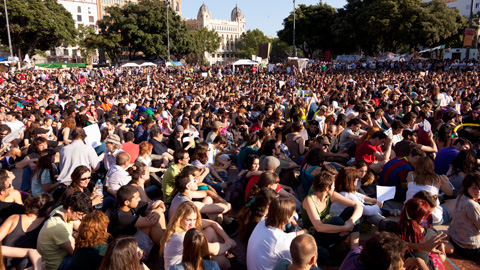Social networks do not help to eliminate inequalities in political participation
According to a UAB research conducted with the support of RecerCaixa new forms of participation, such as voicing opinions through social networks or consumption habits based on ethical and political criteria, do not shorten the inequality gap in political participation among the more vulnerable collectives and the rest of social profiles.

Throughout these past decades, political participation, which was originally limited to electoral participation, has broadened its horizon. Now not only institutional forms are included, but there are also protests and rights of expression, and participation means linked to the private sphere (such as politically motivated consumption). This research, which focuses on the city of Barcelona, studies the characteristics of these emerging forms of political participation, the degree to which it is conditioned by individual resources, and how to compensate these inequalities.
Together with other traditional forms of participation, researchers analysed their presence among the population, their relation with individual characteristics (sex, age, education level, income) and contextual characteristics (socio-demographic characteristics of the place of residence and calls to protest). The objective of the research was to identify how these individual and contextual variables affect probabilities of participating in protests or other forms of political participation.
Researchers were able to verify that Barcelona is a city with a high level of political participation. Almost 90% of citizens stated that they voted at least once in the past five years and over half of them participate in demonstrations and sign petitions. Nearly 40% declare that they donate to causes, participate in social protest activities and have voiced their opinion through political messages on flags, stickers or clothing.
In addition, one third of Barcelonians use texting or social networks to share political contents and have take private political decisions such as using public transport for environmental reasons or becoming an ethical consumer. In contrast, only 10% acknowlege having participated in public hearings, neighbourhood meeting or participatory processes set up by the Barcelona City Council.
Some districts show high percentages in all forms of participation (e.g. Gràcia) and others have lower levels (such as Sant Martí or Ciutat Vella). Thus, the probability of participating in a demonstration is 12 percentage points higher among the neighbours of Gràcia (60% probability) than among those from Sant Martí (48%). At the same time, a person living in Gràcia is twice as likely to participate in a local process (16%) than a person residing in Sant Martí.
Territorial differences can be partially explained due to the differences between citizens of each neighbourhood. Participation is particularly conditioned by education levels, although individual characteristics such as sex, age, origin or income can also affect participation probabilities.
According to the study, the emerging forms of participation (protests, online opinions, political or ethical consumerism), present socio-demographic inequalities which are even more evident than found in the traditional forms.
“These differences in political participation according to socio-demographic attributes are very difficult to reduce. The factors which have a positive effect on participation, such as belonging to associations, interacting in social networks online, do not help to reduce these inequalities; they do not make participation rise amongst the most vulnerable” explains Eva Anduiza, ICREA Academia researcher, lecturer at the Department of Political Science and Public Law at the UAB and head of the research.
The study demonstrates that the existence of a greater offer in local protests are connected to a slight increase in participation of individuals, but not in a reduction of these inequalities. Participation in acts of protest is eith percentage points higher for those who have more than 30 acts in their immediate environment when compared to those with less than 30 acts.
Researchers were also able to verify that violent protest actions have a negative effect on the support given to social movements. This effect is greater amongst citizens belonging to the centre-left political spectrum.
More information:
Project report